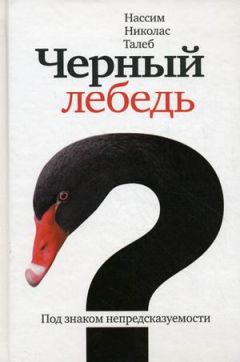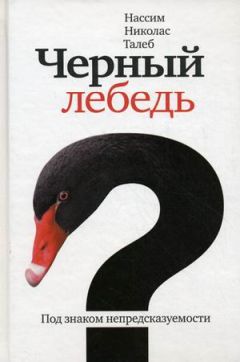Нассим Талеб - Чёрный лебедь. Под знаком непредсказуемости
Uglow, Jenny, 2003, The Lunar Men: Five Friends Whose Curiosity Changed the World. New York: Farrar, Straus & Giroux.
Vale, Nilton Bezerra do, Jose Delfino, and Lucio Flavio Bezerra do Vale, 2005, "Serendipity in Medicine and Anesthesiology." Revista Brasileira de Anestesiologia 55(2): 224-249.
van Tongeren, Paul, 2002, "Nietzsche's Greek Measure." Journal of Nietzsche Studies 24: 5.
Vandenbroucke, J. P., 1996, "Evidence-Based Medicine and 'Medicine d'Observation', " Journal of Clinical Epidemiology 49(12): 1335-1338.
Varela, Francisco J., 1988, Invitation aux sciences cognitives. Paris: Champs Flammarion.
Varian, Hal R., 1989, "Differences of Opinion in Financial Markets." In Courtenay C. Stone, ed., Financial Risk: Theory Evidence and Implications: Proceedings of the Eleventh Annual Economic Policy Conference of the Federal Reserve Bank of St. Louis. Boston: Kitiwer Academic Publishers.
VeHEL, Jacques Levy, and Christian Walter, 2002, Les marches fractals: Efficience, ruptures, et tendances sur les marches financiers. Paris: PUF.
Veyne, Paul, 1971, Comment on ecrit Vhistoire. Paris: Editions du Seuil.
--------, 2005, L'Empire greco-romain. Paris: Editions du Seuil.
Vogelstein, Bert, David Lane, and Arnold J. Levine, 2000, "Surfing the P53 Network."Nature 408: 307-310.
Voit, Johannes, 2001, The Statistical Mechanics of Financial Markets. Heidelberg: Springer.
von Mises, R., 1928, Wahrscheinlichkeit, Statistik und Wahrheit. Berlin: Springer. Translated and reprinted as Probability, Statistics, and Truth. New York: Dover, 1957.
von Plato, Jan, 1994, Creating Modern Probability. Cambridge-Cambridge University Press.
von Winterfeldt, D., and W. Edwards, 1986, Decision Analysis and Behavioral Research. Cambridge: Cambridge University Press.
Wagenaar, Willern, and Gideon B. Keren, 1985, "Calibration of Probability Assessments by Professional Blackjack Dealers, Statistical Experts, and Lay People." Organizational Behavior and Human Decision Processes 36: 406-416.
--------, 1986, "Does the Expert Know? The Reliability of Predictions and Confidence Ratings of Experts." In Erik Hollnagel, Giuseppe Mancini, and David D. Woods, Intelligent Design Support in Process Environments. Berlin: Springer.
Waller, John, 2002, Fabulous Science: Fact and Fiction in the History of Scientific Discovery. Oxford: Oxford University Press.
Wallerstein, Immanuel, 1999, "Braudel and Interscience: A Preacher to Empty Pews?" Paper presented at the 5th Journees Braudeliennes, Binghamton University, Binghamton, N.Y.
Wallsten, T. S., D. V. Budescu, I. Erev, and A. Diederich, 1997, "Evaluating and Combining Subjective Probability Estimates." Journal of Behavioral Decision Making 10: 243-268.
Wason, P. C, i960, "On the Failure to Eliminate Hypotheses in a Conceptual Task." Quarterly Journal of Experimental Psychology 12:129-140.
Watts, D. J., 2003, Six Degrees: The Science of a Connected Age. New York: W. W. Norton and Company.
Watts, D. J., and S. H. Strogatz, 1998, "Collective Dynamics of 'Small-world' Networks." Nature 393: 440-442.
Watts, Duncan, 2002, "A Simple Model of Global Cascades on Random Networks." Proceedings of the National Academy of Sciences 99(9): 5766-5771.
Wegner, Daniel M., 2002, The Illusion of Conscious Will. Cambridge, Mass.: The MIT Press.
Weinberg, Steven, 2001, "Facing Up: Science and Its Cultural Adversaries." Working Paper, Harvard University.
Weintraub, Roy E., 2002, How Economics Became a Mathematical Science, Durham, N.C.: Duke University Press.
Wells, G. L., and Harvey, J. H., 1977, "Do People Use Consensus Information in Making Causal Attributions?" Journal of Personality and Social Psychology 35: 279-293.
Weron, R., 2001, "Levy-Stable Distributions Revisited: Tail Index > 2 Does Not Exclude the Levy-Stable Regime." International Journal of Modern Physics 12(2): 209-223.
Wheatcroft, Andrew, 2003, Infidels: A History of Conflict Between Christendom and Islam. New York: Random House.
White, John, 1982, Rejection. Reading, Mass.: Addison-Wesley.
Whitehead, Alfred North, 1925, Science and the Modern World. New York: The Free Press.
Williams, Mark A., Simon A. Moss, John L. Bradshaw, and Nicole J. Rinehart, 2002, "Brief Report: Random Number Generation in Autism." Journal of Autism and Developmental Disorders 32(1):43-47.
Williams, Robert J., and Dennis Connolly, 2006, "Does Learning About the Mathematics of Gambling Change Gambling Behavior?" Psychology of Addictive Behaviors 20(1): 62-68.
Willinger, W., D. Alderson, J. C. Doyle, and L. Li, 2004, "A Pragmatic Approach to Dealing with High Variability Measurements." Proceedings of the ACM SIGCOMM Internet Measurement Conference, Taormina, Sicily, October 25-27, 2004.
Wilson, Edward O., 2000, Sociobiology: The New Synthesis. Cambridge, Mass.: Harvard University Press.
--------, 2002, The Future of Life. New York: Knopf.
Wilson, T. D., J. Meyers, and D. Gilbert, 2001, "Lessons from the Past: Do People Learn from Experience That Emotional Reactions Are Short Lived?" Personality and Social Psychology Bulletin 29:1421-1432.
Wilson, Т. D., D. Т. Gilbert, and D. B. Centerbar, 2003, "Making Sense: The Causes of Emotional Evanescence." In I. Brocas and J. Carillo, eds., 2003.
Wilson, Т. D., D. B. Centerbar, D. A. Kermer, and D. Т. Gilbert, 2005, "The Pleasures of Uncertainty: Prolonging Positive Moods in Ways People Do Not Anticipate." Journal of Personality and Social Psychology 88(1): 5-21.
Wilson, Timothy D., 2002, Strangers to Ourselves: Discovering the Adaptive Unconscious. Cambridge, Mass.: The Belknap Press of Harvard University.
Winston, Robert, 2002, Human Instinct: How Our Primeval Impulses Shape Our Lives. London: Bantam Press.
Wolford, George, Michael B. Miller, and Michael Gazzaniga, 2000, "The Left Hemisphere's Role in Hypothesis Formation." Journal of Neuroscience 20:1-4.
Wood, Michael, 2003, The Road to Delphi. New York: Farrar, Straus & Giroux.
Wrangham, R., 1999, "Is Military Incompetence Adaptive?" Evolution and Human Behavior 20: 3-12.
Yates, J. E, 1990, Judgment and Decision Making. Englewood Cliffs, N.J.: Prentice-Hall.
Yates, J. E, J. Lee, and H. Shinotsuka, 1996, "BeliefsAboutOverconfidence, Including Its Cross-National Variation." Organizational Behavior and Human Decision Processes 65:138-147.
Yates, J. R, J.-W. Lee, H. Shinotsuka, and W. R. Sieck, 1998, "Oppositional Deliberation: Toward Explaining Overconfidence and Its Cross-cultural Variations." Paper presented at the meeting of the Psychonomics Society, Dallas, Tex.
Yule, G., 1925, "A Mathematical Theory of Evolution, Based on the Conclusions of Dr. J. C. Willis, F. R. S." Philosophical Transactions of the Royal Society of London, Series В 213: 21-87.
Yule, G. U., 1944, Statistical Study of Literary Vocabulary. Cambridge: Cambridge University Press.
Zacks, R. Т., L. Hasher, and H. Sanft, 1982, "Automatic Encoding of Event Frequency: Further Findings." Journal of Experimental Psychology: Learning, Memory, and Cognition 8:106-116.
Zajdenweber, Daniel, 2000,L'economie des extremes. Paris: Flammarion.
Zajonc, R. В., 1980, "Feeling and Thinking: Preferences Need No Inferences." American Psychologist 35:151-175.
--------, 1984, "On the Primacy of Affect." American Psychologist 39:117-123.
Zeki, Semir, 1999, Inner Vision. London: Oxford University Press.
Zimmer, A. C, 1983, "Verbal vs. Numerical Processing by Subjective Probabilities." In R. W. Scholz, ed., Decision Making Under Uncertainty. Amsterdam: North-Holland.
Zipf, George Kingsley, 1932, Selective Studies and the Principle of Relative Frequency in Language. Cambridge, Mass.: Harvard University Press.
--------, 1949, Human Behavior and the Principle of Least Effort. Cambridge, Mass.: Addison-Wesley.
Zitzewitz, Eric, 2001, "Measuring Herding and Exaggeration by Equity Analysts and Other Opinion Sellers." Working Paper, Stanford University.
Zuckerman, H., 1977, Scientific Elite. New York: The Free Press.
--------, 1998, "Accumulation of Advantage and Disadvantage: The Theory and Its Intellectual Biography." In C. Mongardini and S. Tabboni, eds., Robert K. Merton and Contemporary Sociology. New York: Transaction Publishers.
Zweig, Stefan, 1960, Montaigne. Paris: Press Universitaires de France.
Примечания
1
Распространение камер в мобильных телефонах привело к тому, что читатели стали присылать мне изображения черных лебедей в огромных количествах. На прошлое Рож-дество и также получил ящик вина "Черный лебедь'' (так себе), видеозапись (я не смотрю видео) и дне книги. Уж лучше картинки. (Здесь и далее, за исключением особо оговоренных случаев, — прим. автора.)
2
Ожидаемое отсутствие события — тоже Черный лебедь. Обратите внимание, что по законам симметрии крайне невероятное событие — это эквивалент отсутствия крайне вероятного события.
3
Под рекурсивностъю я здесь имею в виду, что в нашем мире возникает все больше реактивных пружин, становящихся причиной того, что события становятся причиной других событий (например, люди покупают книгу, потому что другие люди ее купили), вызывая эффект снежного кома и давая случайный и непредсказуемый результат, который дает победителю все. Мы живем в среде, где информация распространяется слишком быстро, увеличивая размах подобных эпидемий. По той же логике события могут случаться потому, что они не должны случиться. (Наша интуиция настроена на среду с более простыми причинно-следственными связями и медленной передачей информации.) Подобного рода случайности были редкостью в эпоху плейстоцена, поскольку устройство социально-экономической жизни отличалось примитивностью.
4
Глас вопиющего в пустыне (Ис. 40).
5
Кривая нормального распределения, или "гауссова кривая", лежащая в основе любой статистики, — это кривая колоколовидной формы, максимум которой приходится на среднюю величину. Строится на измерении средних значений и отклонений от них. (Прим. перев.)
6
Витгенштейн Людвиг Йозеф Иоганн (1889-1951) — австро-английский философ, автор теории, решающей основные философские проблемы через призму отношения языка и мира. В его трудах они предстают как зеркальная пара: язык отражает мир, потому что tiи ичоская структура языка идентична онтологической структуре мира. (Прим. перев.)
7
Другой пример наивного эмпирицизма — подбирать для поддержки какой-либо идеи вереницу красноречивых цитат из мертвых классиков. Если поискать, вы всегда най-дете кого-нибудь, кто умно высказался в поддержку вашей точки зрения — равно как всегда можно найти другого мертвого мыслителя, который сказал нечто прямо противоположное. Почти все используемые мной изречения, кроме изречений бейсболиста Йоги Берры, при-надлежат людям, с которыми я не согласен.
8
Удивительно, как быстро и как эффективно можно соорудить национальность при помощи флага, нескольких речей и национального гимна; я по сей день избегаю бирки "ливанец", предпочитая более обобщенное "левантинец"
9
Бенуа Мандельброт, испытавший нечто подобное в том же возрасте — правда, лет за сорок до меня, — вспоминает свое военное прошлое как долгие и мучительные периоды скуки, прерываемые краткими вспышками невыразимого страха.
10
Историк Найалл Фергюсон продемонстрировал, что, несмотря на стандартные рассказы о постепенном "назревании" Первой мировой войны, включавшем "рост напряжения" и "эскалацию кризиса", конфликт оказался неожиданностью. Только ретроспективно историки, окидывающие события широким взглядом, сочли его неизбежным. Чтобы подтвердить свою мысль, Фергюсон использовал хитроумный эмпирический аргумент: он изучил цены на государственные облигации, которые обычно отражают ощущения вкладчиков касательно финансовых затруднений государства и падают в преддверии конфликтов, поскольку войны создают резкий дефицит. Но цены на облигации не дают повода предполагать, что вкладчики опасались войны. Обратите внимание, что это исследование, помимо прочего, показывает, как изучение динамики цен помогает лучше понять историю.




